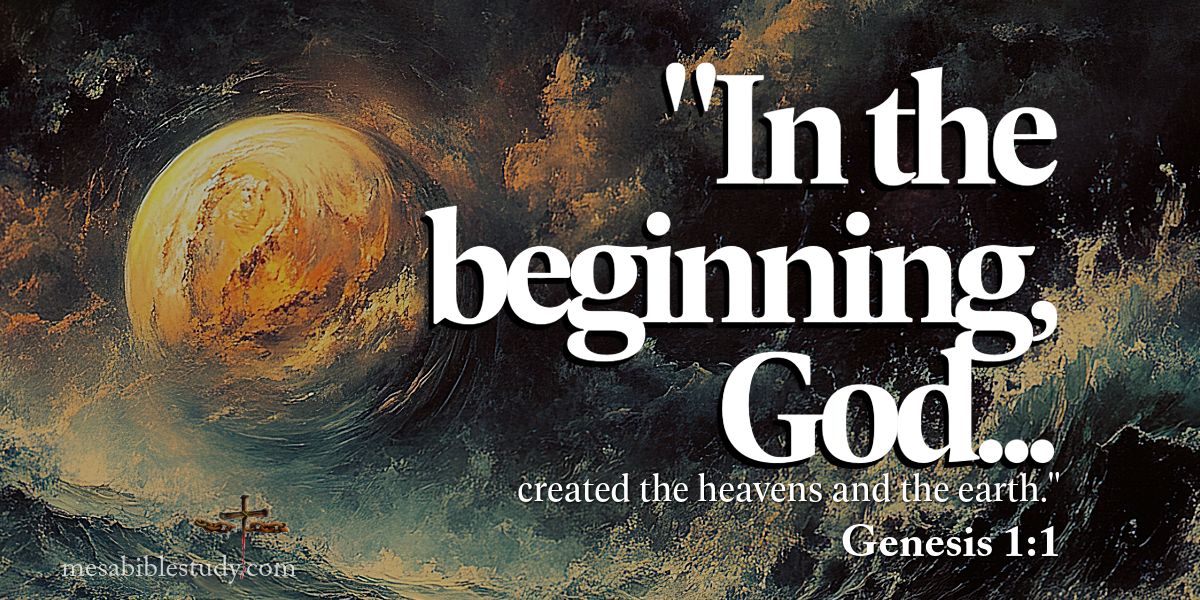📖 Passage Breakdown — Genesis 1:1 — In the Beginning God Created
📜 Background, Setting & Purpose
✍️ Author:
Traditionally Moses, under divine inspiration (John 5:46–47).
👥 Written To:
The nation of Israel, as part of the Pentateuch, to reveal their covenant God and His creative authority.
⏲️ When:
Around 1445–1405 BC during Israel’s wilderness wanderings.
🌍 Setting & Purpose of Genesis:
Genesis opens the entire Bible with the foundational truth: God is Creator. Before history, before man, before Israel, there was God. Genesis establishes His sovereignty, His authority, and His eternal plan.
🔍 Genesis 1:1
“In the beginning God created the heavens and the earth.”
✨ Phrase-by-Phrase Breakdown
“In the beginning…”
- Refers to the start of time, space, and matter. God alone is eternal (Psalm 90:2).
- Time itself has a beginning; God does not.
“…God created…”
- The Hebrew word is bara, meaning to create out of nothing (ex nihilo).
- All things came into existence by His command (Hebrews 11:3).
- This act was not by chance, evolution, or accident—it was by divine will and word.
“…the heavens and the earth.”
- A Hebrew idiom meaning the entire universe (everything seen and unseen).
- This verse summarizes all creation—further details follow in the rest of the chapter.
✝️ Christ in Creation
The Son Spoke Creation Into Being
- John 1:1–3 — “In the beginning was the Word… All things were made through Him.”
- Colossians 1:16–17 — “For by Him all things were created… He is before all things, and in Him all things consist.”
- Hebrews 1:2 — “…through whom also He made the worlds.”
It was God the Son, the eternal Word, who spoke creation into existence.
The Father’s Role
- The plan and will of creation originated in the Father (Isaiah 45:12).
The Spirit’s Role
- Genesis 1:2 — “And the Spirit of God was hovering over the face of the waters.”
- The Spirit was active in ordering and sustaining creation.
The Triune God worked in perfect unity:
- The Father purposed it.
- The Son spoke it.
- The Spirit empowered and ordered it.
❌ What This Passage Does Not Mean
- It does not leave room for atheism (“God created” is the subject).
- It does not teach evolution or chance.
- It does not suggest that Jesus was absent in creation—He was the very Word who spoke it.
✅ What It Does Mean
- All creation owes its existence to the Triune God.
- Jesus of Nazareth, who walked the dusty roads of Galilee, is the eternal Creator.
- The same hands pierced on the cross are the hands that flung stars into space.
- Creation is not self-sustaining—Christ continues to hold all things together (Colossians 1:17).
🙏 Devotional/Doctrinal Summary
Genesis 1:1 is not just the opening of Scripture—it is the bedrock of all reality. The eternal Son of God, Jesus Christ, spoke the universe into being. He created the hill on which He would die, the tree from which the cross was made, and the very men who nailed Him there.
This truth should leave us in awe: the Creator of galaxies humbled Himself, became a man, and gave His life for us.
The same voice that said “Let there be light” is the same voice that said “It is finished.”

0 Comments